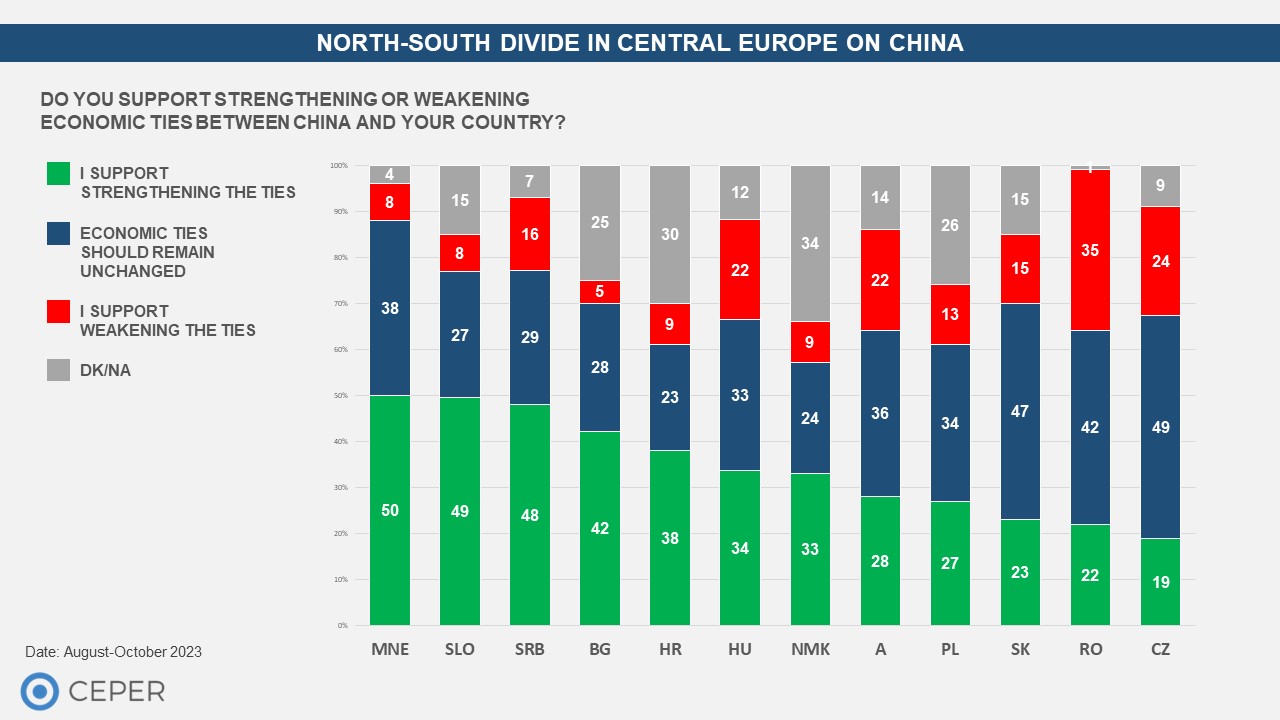North-South Divide in Central Europe on China
Not only Western decisionmakers, but the Central European public is also divided on how to manage economic relations with China. A poll conducted by CEPER in 12 countries of the region shows that there is a clear popular support neither for strengthening nor for weakening economic ties with the People’s Republic. A relative majority is for closer or unchanged cooperation, while severing ties is not favoured by Central Europeans.
The Belt and Road Initiative of the People’s Republic of China marked its 10th anniversary in September. Over the past decades, due to the Belt and Road Initiative and other projects strong economic ties developed between Central Europe and China. According to Eurostat, China was the EU’s top partner with the highest value of exports in 2022. While in 2002 imports from China stood at 7.8% of the total EU imports of goods, by 2022 20.9% of EU imports originated in China. There is a growing interdependence between European member states and the Asian country which Western decisionmakers try to tackle by a de-risking strategy.
CEPER conducted an opinion poll in 12 Central European countries to better understand how Central Europeans think about their country and China’s relationship. 1,000 respondents from each of the 12 studied European countries were asked whether they support strengthening or weakening economic ties between China and their country. When answering this question respondents could choose between supporting to weaken or strengthen economic ties between China and their country, or to prefer leaving economic ties unchanged at the current level.
CEPER found a North-South divide on the China-question. There are 6 Central Eastern European (mostly Southern) countries where the relative majority of the public favours strengthening economic relations with China, while in another 3 regional (mostly Northern) countries the relative majority favours keeping economic relations on the current level.
Bulgaria and the former Yugoslavian countries belong to the first group. 50% of Montenegrins, 48% of Serbs and 49% of Slovenes wished to strengthen economic ties with China. In Croatia (38%), North Macedonia (33%) and in Bulgaria (42%) too, the largest proportion of respondents supported stronger economic connections. 34% of respondents from North Macedonia, an EU candidate and NATO member state, were not able to (or refused to) answer this question.
Countries with a more cautious attitude to China have stronger relations to the US. In Romania 42, in Slovakia 47 and in Czechia 49% of the population would not change the current level of economic ties with China. That is, they would neither deepen, nor weaken trade relations with the People’s Republic. Among them, the Romanian society is the most critical: 35% of Romanians wish to weaken economic relations with Beijing, which is 11 percentage points higher than in any other regional countries.
There is also a third, rather undecided group of Central European countries. In these nations the gap between those who prefer ’more economic relations’ and those who argue for ’unchanged relations’ is not significant. In Austria the gap is only 8, in Poland 7 and in Hungary 1 percentage points. Neither strengthening, nor weakening or holding economic relations unchanged have more than 40% support in these societies. 28% of Austrians, 34% of Hungarians and 27% of Poles are in favour of deeper relations. 22% of Austrians and Hungarians, while 13% of Poles wish to seek weaker trade relations with China.
In general, weakening ties with China was not supported in either of the studied countries. A majority of respondents valued economic ties with China and – especially in the more Southern countries in the region – saw potential in expanding trade relations. However, it does not mean that a de-risking strategy would not be popular. The only question is what it means exactly.

Methodology
The opinion-poll survey was carried out in 12 countries in the Central European region: Austria, Bulgaria, Croatia, Czech Republic, Hungary, Romania, Serbia, Slovakia, Slovenia, North Macedonia, Montenegro and Poland. The data were collected between 21 August and 08 September 2023 (in October 2023 in Hungary). The survey was conducted by telephone (in person in Serbia and Montenegro) with 1 000 respondents per country. The sample per country is representative by gender, age and type of settlement.
About us
CEPER is the brand of CEPER Group GmbH. The CEPER acronym abbreviates Central European Perspectives. CEPER's area of expertise is Central European affairs, the company offers media monitoring, market research and opinion polls from the region to its clients.
|
|
Austria |
Bulgaria |
Croatia |
Czechia |
Hungary |
Montenegro |
North Macedonia |
Poland |
Romania |
Serbia |
Slovakia |
Slovenia |
|
I support strengthening the ties |
28 |
42 |
38 |
19 |
34 |
50 |
33 |
27 |
22 |
48 |
23 |
49 |
|
Economic ties should remain unchanged |
36 |
28 |
23 |
49 |
33 |
38 |
24 |
34 |
42 |
29 |
47 |
27 |
|
I support weakening the ties |
22 |
5 |
9 |
24 |
22 |
8 |
9 |
13 |
35 |
16 |
15 |
8 |
|
DK/NA |
14 |
25 |
30 |
9 |
12 |
4 |
34 |
26 |
1 |
7 |
15 |
15 |
Do you support strengthening or weakening economic ties between China and your country?